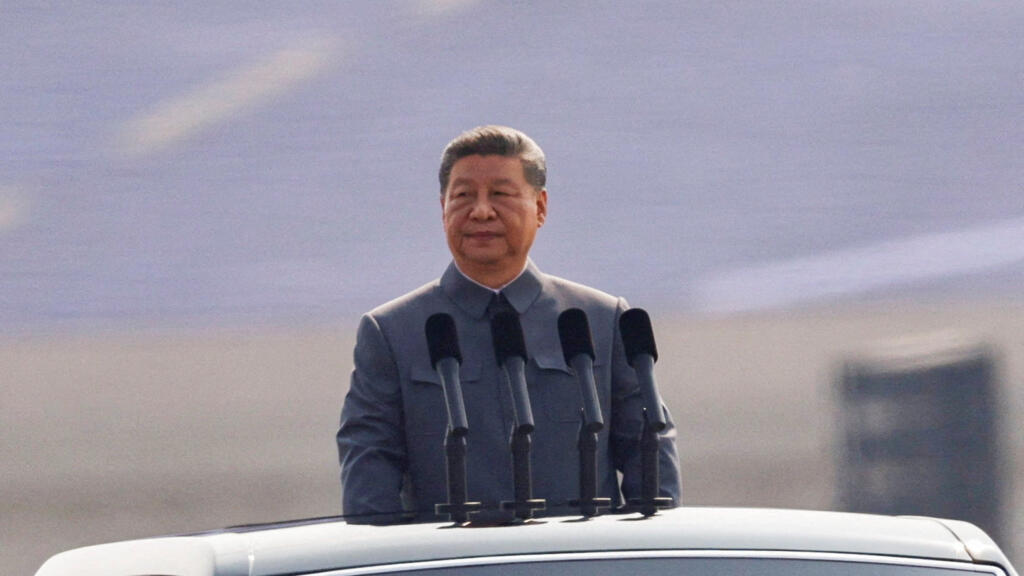Top Stories
China Unveils Ambitious Emission Reduction Targets by 2035

Chinese President Xi Jinping announced on September 27, 2023, that China aims to reduce its greenhouse gas emissions by 7% to 10% below peak levels by 2035. This commitment was made during a live video address to the United Nations, where Xi emphasized the need for global cooperation in the face of climate challenges.
Xi’s speech was part of a climate leaders’ summit hosted by UN Secretary-General António Guterres. He outlined China’s national climate strategy ahead of the upcoming COP30 climate summit in Brazil, scheduled for November. Along with the emissions reduction goal, Xi highlighted plans to increase the country’s installed capacity of wind and solar energy to over six times its 2020 levels within a decade. He also stated that China intends to raise the share of non-fossil fuels in its domestic energy consumption to exceed 30%.
While outlining these ambitious targets, Xi urged developed nations to take a leading role in climate action. He indirectly criticized the United States for its withdrawal from international climate commitments, stating, “Green and low-carbon transformation is the trend of our times. Despite some countries going against the trend, the international community should stay on the right track.”
In a contrasting move, US President Donald Trump dismissed climate change as a “con job” during his address at the UN General Assembly. Trump reiterated his administration’s stance by announcing a second withdrawal from the Paris Agreement, which aims to limit global temperature rise to below 1.5 degrees Celsius. This withdrawal underscores the complexities surrounding international climate agreements, as the US is recognized as the world’s largest historical greenhouse gas emitter and the second-largest current emitter, following China.
International reactions to these announcements indicate a growing concern over the inadequacy of current commitments by major economies. Environmental groups have criticized the responses from some nations, suggesting they fall short of the urgent emissions reductions necessary to combat climate change effectively.
Brazilian President Luiz Inácio Lula da Silva, the host of the upcoming climate summit, warned that the meeting in Belém would reveal whether global leaders are genuinely committed to the scientific consensus on climate change. Brazil has pledged to cut emissions by 59% to 67% by 2035 while intensifying efforts against deforestation.
In addressing the summit, Guterres urged countries to announce their updated climate targets. He remarked, “The Paris Agreement has made a difference,” noting a decrease in projected global temperature rise from 4 degrees Celsius to 2.6 degrees Celsius since the agreement’s adoption in 2015. Guterres called for “new plans for 2035 that go much further, much faster.”
The European Union has yet to finalize its long-term climate target but indicated it is on track to achieve a 55% reduction in emissions by 2030. EU President Ursula von der Leyen mentioned that the bloc aims for a 66% to 72% reduction by 2035.
Australia, which is set to host the 2026 UN climate summit, announced its commitment to reduce greenhouse gas emissions by 62% to 70% below 2005 levels by 2035. Prime Minister Anthony Albanese emphasized the importance of collaboration among nations, stating, “We want to bring the world with us on climate change, not by asking any nation to forgo the jobs or security that its people deserve, but by working with every nation to seize and share those opportunities.”
Representing the Alliance of Small Island States, President of Palau Surangel Whipps called for aggressive action from major economies, highlighting Palau’s goal to reduce emissions to 44% of 2015 levels by 2035. Whipps referenced an advisory opinion from the International Court of Justice that affirmed the legal obligation for governments to enhance their measures against greenhouse gas emissions.
The varied commitments from these nations reflect a broader dialogue on the urgency of climate action. Li Shuo, director of the China Climate Hub at the Asia Society, remarked that while China’s targets may seem cautious, they indicate a significant political tradition of steady decision-making. He suggested that China’s position as a leader in green technology could prompt a more proactive role in global climate efforts.
As the world prepares for the COP30 summit, the effectiveness and ambition of national climate plans will be scrutinized, emphasizing the necessity for immediate and substantial action to address climate change.
-

 Lifestyle4 months ago
Lifestyle4 months agoHumanism Camp Engages 250 Youths in Summer Fest 2025
-

 Business5 months ago
Business5 months agoKenvue Dismisses CEO Thibaut Mongon as Strategic Review Advances
-

 Sports4 months ago
Sports4 months agoDe Minaur Triumphs at Washington Open After Thrilling Comeback
-

 Sports5 months ago
Sports5 months agoTupou and Daugunu Join First Nations Squad for Lions Clash
-

 Top Stories5 months ago
Top Stories5 months agoColombian Senator Miguel Uribe Shows Signs of Recovery After Attack
-

 World5 months ago
World5 months agoASEAN Gears Up for Historic Joint Meeting of Foreign and Economic Ministers
-

 Health4 months ago
Health4 months agoNew Study Challenges Assumptions About Aging and Inflammation
-

 Business5 months ago
Business5 months agoOil Prices Surge Following New EU Sanctions on Russia
-

 Entertainment4 months ago
Entertainment4 months agoDetaşe-Sabah Violin Ensemble Captivates at Gabala Music Festival
-

 Entertainment4 months ago
Entertainment4 months agoBaku Metro Extends Hours for Justin Timberlake Concert
-

 Top Stories5 months ago
Top Stories5 months agoRethinking Singapore’s F&B Regulations Amid Business Closures
-

 Business5 months ago
Business5 months agoU.S. House Approves Stablecoin Bill, Sends to Trump for Signature









